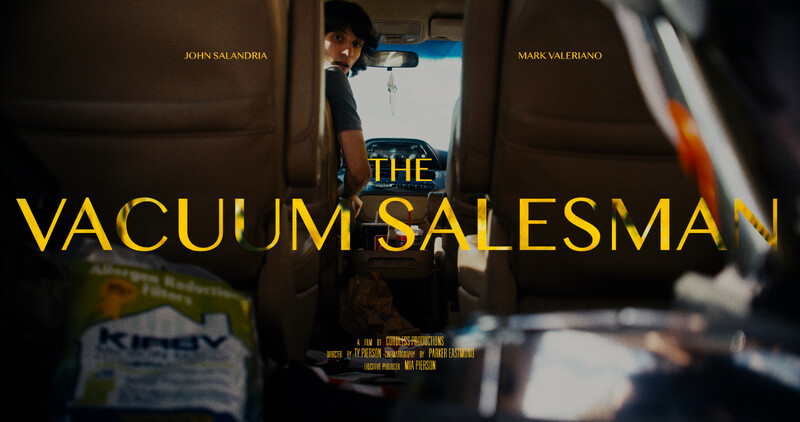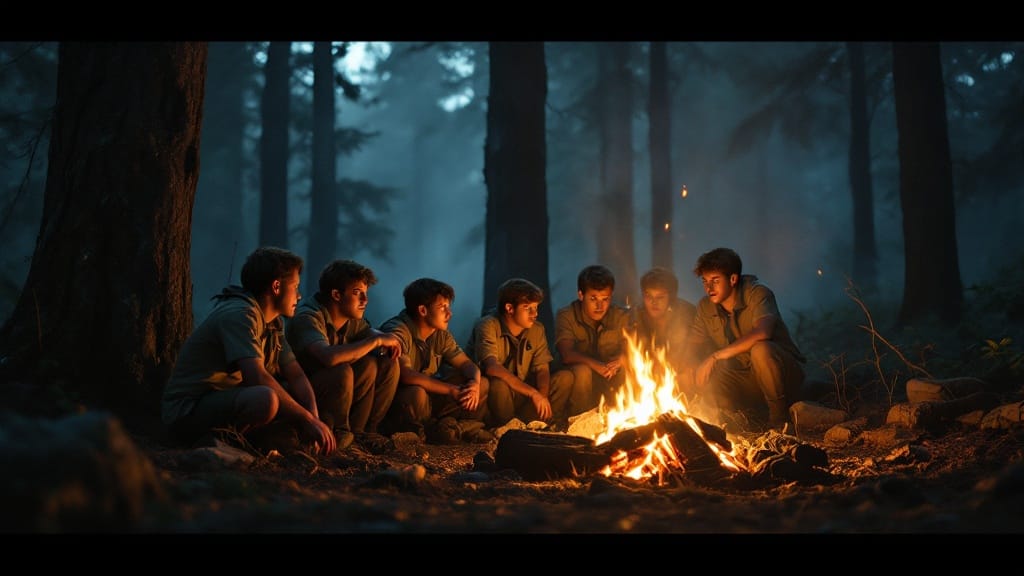Drama
The Vacuum Salesman

Warning – This review may contain spoilers.
When I watched The Vacuum Salesman, I immediately felt a sense of unease and tension building from the first scene. The film, directed by Ty Pierson, introduces us to a vacuum salesman named Cody, played brilliantly by John Salandria. Cody attempts to sell a vacuum cleaner to Logan, a high school acquaintance (played by Mark Valeriano), and what starts as an awkward sales pitch quickly spirals into a tense and emotionally charged encounter. As we watch Cody unravel, it becomes clear that the missing vacuum part isn’t the real issue; instead, it’s a symbol of something much deeper that’s broken in his life.
One thing that struck me about the film was how effectively the technical elements supported the story. The cinematography is deliberate, with framing and color choices that highlight Cody’s mental state. The shots with the rearview mirror and the potted yellow flowers are particularly striking, using soft hues of yellow and blurring to symbolize the fragility of Cody’s grasp on reality. These moments, combined with subtle lighting and a well-paced score, set a mood that kept me on edge the entire time. The sound design, especially, plays a crucial role in underscoring Cody’s emotional breakdown—there’s an intensity that builds quietly in the background and explodes in key moments.
What I found fascinating is how the film plays on the idea of old grudges, even though Logan doesn’t seem to remember Cody or any prior grievances. The lack of explanation about their past creates this palpable tension that leaves a lot to the viewer’s imagination. I couldn’t help but wonder what had happened between these two characters in high school, but at the same time, I appreciated that the film didn’t spoon-feed that information. Instead, it allows Cody’s emotional state and erratic behavior to tell the story. The presence of Logan’s child serves as a turning point, stopping Cody from whatever misguided form of revenge he may have been contemplating and grounding him in the reality of what truly matters.
The film does a great job of conveying universal themes like failure, desperation, and comparison. Logan, with his perfect family life (symbolized by the neat little pot of flowers), serves as a stark contrast to Cody’s chaotic life, reflected in the broken vacuum. It’s a relatable feeling—comparing ourselves to others, especially those we knew from the past—and this relatability is why I think audiences will connect with this film. Even though Cody’s actions are extreme, his sense of inadequacy and frustration are emotions that many of us have likely felt at one point or another.
There were minor technical flaws, such as a couple of strange camera angles and a few moments where the editing seemed off, but they didn’t detract too much from my overall experience. In fact, they added a raw, almost unpolished feel to the film, which worked well with the chaotic headspace Cody is in. The performances from Salandria and Valeriano were fantastic, with both actors embodying their characters fully and bringing a sense of authenticity to their interactions. Salandria, in particular, really sold the desperation of a man who feels like his life has spiraled out of control.
By the end of The Vacuum Salesman, I was left thinking about the weight of the past and how unresolved emotions can bubble to the surface in unexpected ways. Pierson crafted a story that is both entertaining and thought-provoking, mixing dark comedy with drama and tension in a way that keeps you engaged. It’s the kind of film that may be short in length but leaves a lasting impression.
Ultimately, The Vacuum Salesman is a tightly crafted narrative that explores themes of regret, failure, and the haunting effects of comparison. While the story is straightforward, its deeper emotional layers make it a film that resonates beyond its surface. I believe audiences will enjoy this film not only for its technical prowess but also for its relatable and human story.
Comedy
Troop 458

WARNING! This review contains SPOILERS!
Troop 458, written by Trevor Allen, captures the often daunting, yet transformative, experience of being the new kid in a world full of unknowns. We follow Sidney, an anxious boy thrown into his first Boy Scouts campout, where he faces both the perils of acceptance and the strangeness of his eccentric scout leader. As spooky campfire tales start to weave into reality, Sidney is forced to confront his fears head-on, finding moments of humor, adventure, and unexpected camaraderie along the way.
I like the concept of Troop 458 because it blends coming-of-age themes with a playful sense of adventure, all wrapped in an atmosphere tinged with just the right amount of mystery. Allen’s writing brings to life a cast of memorable characters, especially through Sidney’s journey of growth. The tension between humor and fear feels authentic to the Boy Scouts’ setting, and it captures the real challenges kids face when trying to fit in.
What resonated with me most was the screenplay’s exploration of courage—not just in facing mythical dangers but in embracing who you are, quirks and all. Some aspects could benefit from a clearer focus on character motivations and tighter pacing to keep the momentum strong, particularly during scenes that blur the line between myth and reality.
The dialogue is great in many places, offering humor that feels natural for a group of young scouts. There were moments where I felt the conversations could be a bit sharper or more distinct to heighten the comedic or emotional impact. Character development is a strong suit, with Sidney’s evolution being both relatable and satisfying, but secondary characters could have a bit more depth to elevate the ensemble.
Allen’s Troop 458 is polished, with solid grammar, spelling, and formatting that adhere to professional standards. The structure is clean and makes for an easy read, setting up scenes that are visually compelling.
Troop 458 delivers an enjoyable mix of humor, heart, and a touch of the supernatural, leaving me eager to see how it might come to life on screen.
Drama
Ellie

WARNING! This review contains SPOILERS!
Directed by Marcus Mejia
Ellie is a refreshing experience that pulled me right into the world of a young, shy man navigating a work meeting while secretly yearning for a bit of magic in his everyday life. We’re taken through his imaginative, musical daydream—a beautiful escape from reality that reveals his true desires. I loved how the film peeled back layers of his personality without a single word of dialogue. Instead, the music carried the narrative, and surprisingly, it worked so well.
Marcus Mejia did an excellent job blending dramedy elements to keep the film engaging. The moments of humor and more emotional beats make the film feel well-rounded. Mejia’s choice to swap dialogue for music was a bold move, and it paid off. I could feel the character’s internal struggles and hopes as the music brought out emotions words couldn’t.
The lighting felt intimate, almost like it was giving us a window into the protagonist’s soul, and the cinematography perfectly captured the whimsical tone of his daydreams. I noticed how smoothly the editing transitioned between reality and fantasy, which made the story’s pacing feel just right. The sound design was on point, with every beat of music syncing beautifully with the character’s emotional highs and lows.
I loved when the protagonist’s daydream overlapped with reality, creating this seamless blend that felt so relatable. I admired how it portrayed the quiet, unspoken dreams we all carry. It was a reminder of the power of our inner worlds and how much magic lies just beneath the surface of our everyday lives.
Ellie left a gentle yet lasting impression. It’s a unique, heartfelt short film that shows how creative risks can pay off. Ellie is a memorable journey that’s definitely worth the watch.
Drama
Finding Acceptance

Directed by Andrew DeBennett
WARNING! This review contains spoilers.
Watching “Finding Acceptance” was an experience that brought me back to those anti-bullying films we’d see in school assemblies. The story follows Mary, a new student in a wheelchair, navigating the often-tough world of school friendships. Initially, she faces teasing from her peers but finds a genuine friend in Liz, who even manages to extend kindness to Mary’s bully, Max. The message is straightforward and clear: acceptance and empathy matter.
I could see what the director was aiming for—Andrew DeBennett notes that the film was both a joy to create and a personal project. The heart of the story shines through, with Kaylah Pollock (Mary) and Laney Hansen (Liz) bringing warmth to their roles. Their connection feels genuine, even if the overall story feels a bit too familiar.
Technically, the film could have used some fine-tuning. The sound mix was rough, with the music often drowning out dialogue. The editing also felt choppy, making it harder to stay immersed in the story. The dialogue leaned into clichés—phrases like “loser” felt outdated and took away from the realism. The cinematography, however, was a bright spot, creating a warm, inviting feel that suited the film’s positive message.
I felt like the story could’ve benefited from more depth. The bullying that Mary faces is minimal, making her eventual friendships feel somewhat predictable. For younger audiences, this simplicity might be engaging and easy to digest, but it misses the chance to delve into the more complex aspects of acceptance.
In the end, “Finding Acceptance” delivers a positive, albeit simple, message. While it didn’t connect with me on a deeper level, I can see it being a useful film for educational settings, especially for younger viewers learning about kindness and friendship.










